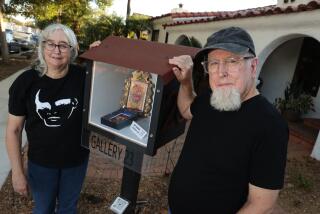Two perspectives on no way out by Eamon Ore-Giron
A two-channel video is the centerpiece of a somewhat slight but nonetheless involving installation by Eamon Ore-Giron at LAXART. The work is one of three small shows that inaugurate the nonprofit galleryâs new location in Hollywood.
Projected onto adjoining walls in the corner of a modest room, the videos encapsulate a vague sense of having no way out. Thatâs fitting for the subject, which is the relocation of Morococha, a small village high in the Peruvian Andes, in order to accommodate the brutal open-pit copper mine being developed by the Chinese corporation Chinalco.
One video surveys the bleak and unlovely new town. The other probes the ruins of the abandoned village, interspersed with shots of hands digging in the dirt with the aid of a copper trowel.
It isnât only the mineral that the artist hopes to unearth.
Ore-Giron, whose father was a Peruvian immigrant to Arizona, provides no voice-over narration or text. Rather than a polemic, he lets his cameraâs images and ambient sound â the wind, a barking dog, kids kicking a soccer ball â poetically tell the story. (The artist is also an abstract painter and sculptor.) The videos provide context for each other.
For instance, a picture tacked to a wall in a tumble-down house shows an idealized scene of women gathered in a lush and verdant valley landscape; it functions here as a romanticized memory for displaced, unseen inhabitants.
On the other video, a helpless sheep is incongruously stranded on a concrete sidewalk next to a newly paved highway. Point made.
In neither video does Morococha come across as a âparadise lostâ to the might of corporate industry. Instead itâs a rough, hardscrabble place like countless others, its residents inevitably subjected to forces larger than themselves.
On a wall opposite the videos Ore-Giron has hung a small landscape painting by JosuĂŠ SĂĄnchez Cerron, a well regarded artist with whom he lived during a stay in Peru. Painted in flat, bright colors, it reads from top to bottom: mountains and a church, then houses and farms, followed by a cut-away view of mining beneath the surface of the Earth and, finally, the lifeless body of a miner sprawled on the ground.
A cyclical mountain narrative plays out. Formally itâs unlike the one in Ore-Gironâs videos, but conceptually not so different.
LAXART, 7000 Santa Monica Blvd., Hollywood, (323) 871-4140, through Feb. 28. Closed Sundays and Mondays. www.laxart.org
More to Read
The biggest entertainment stories
Get our big stories about Hollywood, film, television, music, arts, culture and more right in your inbox as soon as they publish.
You may occasionally receive promotional content from the Los Angeles Times.











